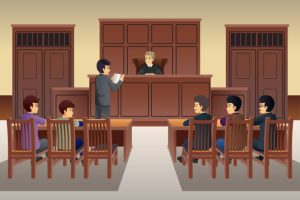In criminal law, the term “evidentiary hearing” is frequently encountered, yet many people may not fully understand its significance or procedural intricacies. This post aims to clarify what an evidentiary hearing entails, its purpose within criminal proceedings, and its impact on the justice system.
What is an Evidentiary Hearing? An evidentiary hearing in criminal law is a legal proceeding in which a judge examines evidence and hears testimony to resolve specific factual disputes or to determine the admissibility of certain evidence before a trial. Unlike a full trial, an evidentiary hearing is typically more focused, addressing particular issues that may arise during the pre-trial phase of a criminal case.
Evidentiary hearings are especially common in cases involving motions to suppress evidence, challenges to the legality of arrests, or questions about a defendant’s mental competency. By evaluating the evidence presented, the judge can make informed decisions that can significantly influence the course of a case or the trial.
What is the Purpose of an Evidentiary Hearing? The primary purpose of an evidentiary hearing in criminal matters is to provide the court with a platform to assess evidence related to specific legal issues. Key objectives include:
- Determining Admissibility of Evidence: A significant aspect of criminal proceedings involves the admissibility of evidence. An evidentiary hearing allows the judge to determine whether certain evidence was obtained lawfully and whether it meets the standards for admissibility under the rules of evidence.
- Addressing Pre-Trial Motions: Criminal defense attorneys often file motions to suppress evidence, arguing some evidence was obtained in violation of the defendant’s constitutional rights. An evidentiary hearing provides a forum for the judge to hear arguments and examine the facts surrounding the evidence in question.
- Resolving Factual Disputes: In cases where there are conflicting accounts or discrepancies regarding the facts, an evidentiary hearing allows the court to assess the credibility of witnesses and the reliability of their testimony, aiding in the establishment of factual clarity.
- Promoting Fair Trials: By resolving preliminary issues before the main trial, evidentiary hearings help streamline the judicial process and ensure that trials focus on relevant and legally admissible evidence, contributing to a fair trial for the defendant.
Procedure of Evidentiary Hearings: The procedure for an evidentiary hearing in criminal matters typically follows these steps:
- Notice: All parties involved in the case must receive proper notice of the hearing, including details regarding the time, location, and purpose.
- Presentation of Evidence: Both the prosecution and the defense have the opportunity to present evidence. This may include witness testimony, documents, and other relevant materials. The party seeking to suppress evidence generally bears the burden of proof.
- Cross-Examination: Witnesses can be cross-examined by the opposing party, allowing for challenges to their credibility and the reliability of their testimony.
- Rulings by the Judge: After considering the evidence and arguments, the judge will make a ruling on the issues presented. This ruling could involve the suppression of evidence, determination of witness admissibility, or other significant pre-trial decisions.
- Documentation: The proceedings are typically recorded, and a transcript may be created for future reference, especially if the ruling is subject to appeal.
Conclusion: Evidentiary hearings are a critical component of the criminal justice process, providing a structured environment for the examination of evidence and the resolution of legal disputes prior to trial. By allowing judges to assess the admissibility of evidence and clarify factual issues, these hearings play a vital role in ensuring that the rights of defendants are upheld and that the trial process is fair and efficient.
For individuals involved in a criminal case, understanding the role of evidentiary hearings can be crucial. If you find yourself facing an evidentiary hearing, seeking guidance from an experienced criminal defense attorney is essential to ensure that your rights are protected and that you navigate the legal landscape effectively.
The Law Offices of Susan L. Hartman is here to help if you have been arrested and/or charged with a DUI in California. Contact us today for your free case evaluation.
Call: 619.260.1122
Text/Call: 858.365.3316
Email: susan@shartmanlaw.com
 San Diego DUI Lawyers Blog
San Diego DUI Lawyers Blog


